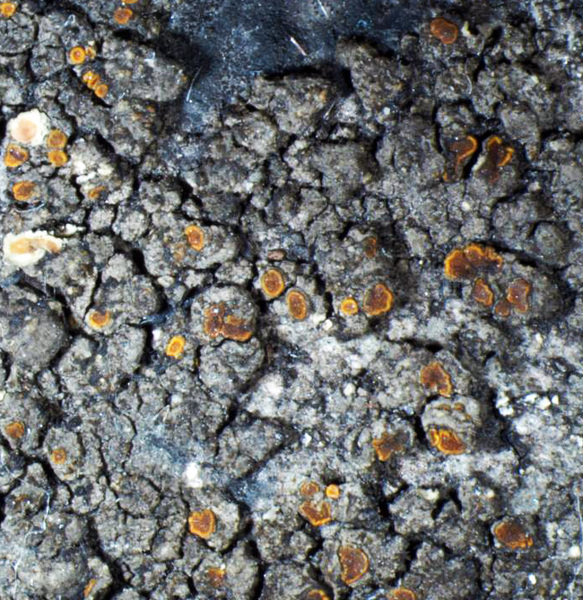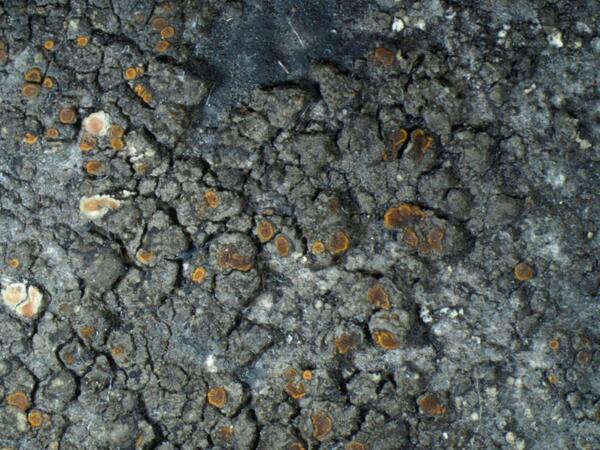Rufoplaca tristiuscula (H. Magn.) Arup, Søchting & Frödén
Nord. J. Bot., 31: 74, 2013. Basionym: Caloplaca tristiuscula H. Magn. - Bot. Not.: 50, 1944.
Synonyms:
Description: Thallus crustose, episubstratic, rather thick, dark grey to blackish grey, rimose-areolate and often verruculose, forming large patches. Cortex paraplectenchymatous; medulla poorly evident. Apothecia zeorine, sessile, round to angular by mutual compression, 0.5-1.2 mm across, with an initially concave, then flat, orange to dark orange disc, a persistent, smooth, thin, distinctly paler proper margin and a dark grey, usually well-evident, only finally sometimes excluded thalline margin. Thalline exciple with abundant algae; proper exciple prosoplectenchymatous, with anthraquinone crystals; epithecium inspersed with orange-yellow crystals of anthraquinones reacting K+ purple-red; hymenium colourless; paraphyses simple to sparingly branched in upper part, the apical cells up to 5 μm wide; hypothecium colourless. Asci 8-spored, clavate, functionally unitunicate, apically thickened with a broad internal beak, the inner part of apex and external cap I+ blue, Teloschistes-type. Ascospores 2-celled, polarilocular, narrowly ellipsoid, 10-16 x 4.5-7 μm, the equatorial thickening (“septum”) 2.5-4 μm. Photobiont chlorococcoid. Spot tests: thallus K- or K+ weakly violet in section, C- or C+ violet, KC-, P-; disc of apothecia K+ purple-red. Chemistry: thallus with the Sedifolia-grey pigment; disc of apothecia with unchlorinated anthraquinones.
Growth form: Crustose
Substrata: rocks
Photobiont: green algae other than Trentepohlia
Reproductive strategy: mainly sexual
Poorly known taxon in need of further study
Commonnes-rarity: (info)
Alpine belt: very rare
Subalpine belt: very rare
Montane belt: absent
Dry submediterranean belt: absent
Humid submediterranean belt: absent
Padanian area: absent
pH of the substrata:
1 2 3 4 5
Solar irradiation:
1 2 3 4 5
Aridity:
1 2 3 4 5
Eutrophication:
1 2 3 4 5
Poleotolerance:
0 1 2 3
Altitudinal distribution:
1 2 3 4 5 6
Rarity
absent
extremely rare
very rare
rare
rather rare
rather common
common
very common
extremely common
Loading data...
Occurrence data
Predictive map
Growth form: Crustose
Substrata: rocks
Photobiont: green algae other than Trentepohlia
Reproductive strategy: mainly sexual
Poorly known taxon in need of further study
Commonnes-rarity: (info)
Alpine belt: very rare
Subalpine belt: very rare
Montane belt: absent
Dry submediterranean belt: absent
Humid submediterranean belt: absent
Padanian area: absent
pH of the substrata:
| 1 | 2 | 3 | 4 | 5 |
Solar irradiation:
| 1 | 2 | 3 | 4 | 5 |
Aridity:
| 1 | 2 | 3 | 4 | 5 |
Eutrophication:
| 1 | 2 | 3 | 4 | 5 |
Poleotolerance:
| 0 | 1 | 2 | 3 |
Altitudinal distribution:
| 1 | 2 | 3 | 4 | 5 | 6 |
Rarity
absent
extremely rare
very rare
rare
rather rare
rather common
common
very common
extremely common
Loading data...
Occurrence data
Predictive map








